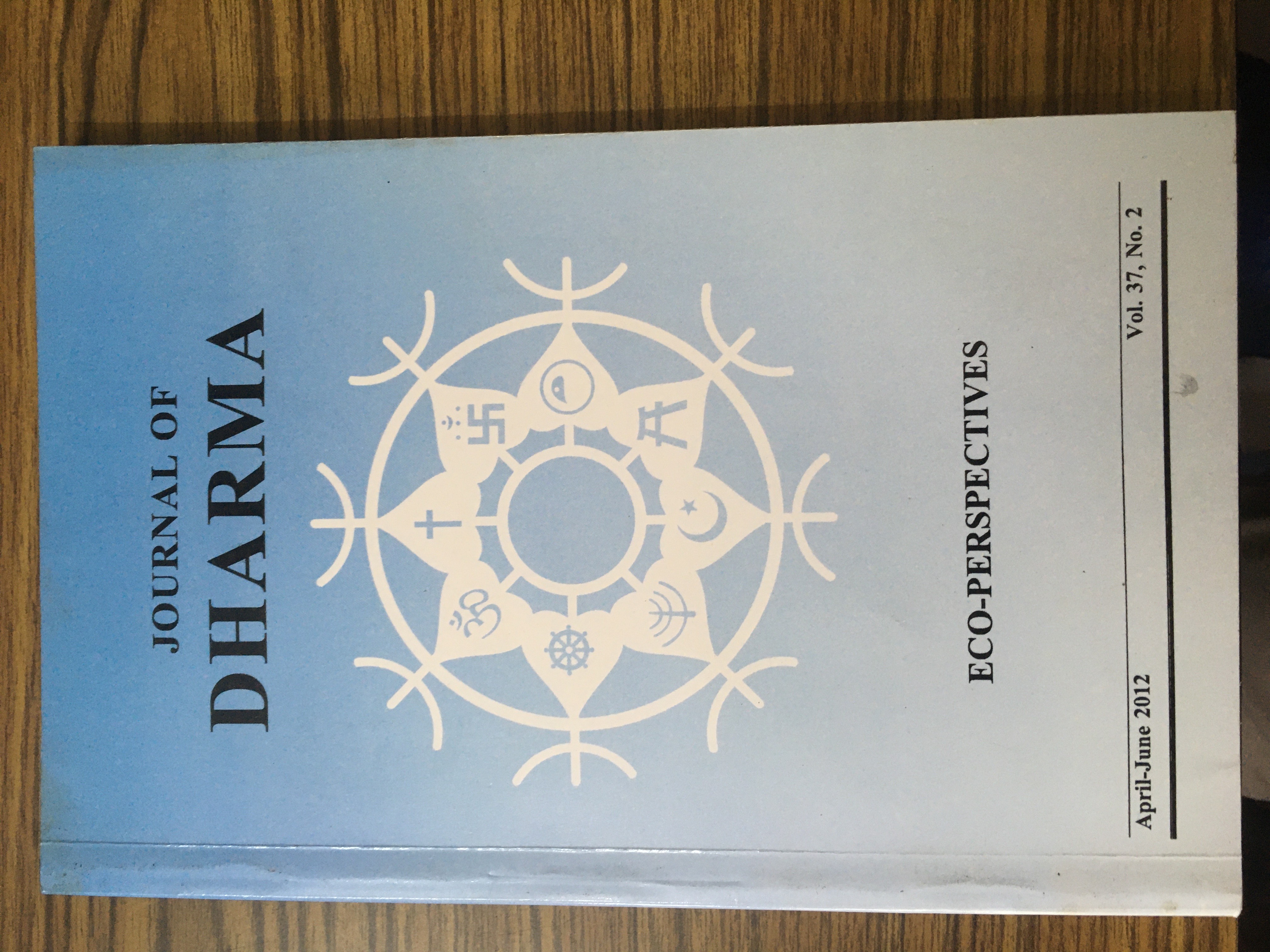AN ECOLOGICAL PARADIGM: After Communion Ecclesiology of Vatican II
Keywords:
Self-Understanding of Church as Communion in Vatican II, Dynamism of Vatican II, Communion according to Vatican II and the Post-Conciliar Documents, Communion in the Model of Trinity, Ecclesial Communion, Towards an Ecological Paradigm, ‘Subdue’ vs. ‘Care for’ and ‘Consumerism’ vs. ‘Mutual Enriching’, Church Pronouncements, Trinitarian God as the Centre of Ecological Theology, Peaceful Environmental PraxisAbstract
The agrarian world kept their desire to plant their feet firmly on mother earth. There was a sense of rootedness and connectedness to the earth as a created reality.The importance of the earth is not only because it provides human needs, but also because “the earth carries the psychic structure as well as the physical form of every living being upon the planet.” Mountains and huge rocks balance the earth. But economic growth and technological advancements play a serious role in disturbing earth and soil. By the emergence of large earth movers and transportation facilities the face of the earth is fast changing. Ancient Church buildings and other institutions on the hilltops gave an impression that we are the caretakers of the Nature. But today instead of taking care of the earth, we empty the earth by selling the soil and constructing unbearable huge buildings. In this context the Church has a vital role to recapture the image as the “blessing to the nations” (Genesis 22:18). While the Catholic Church is celebrating the 50th year of the opening of Second Vatican Council, the communion ecclesiology of the Councul could shed light on our earth concerns providing a new ecological paradigm.
References
Amado L. Picardal, “Environmental Praxis of Basic Ecclesial Communities: An Ecclesiological Perspective,” Hapag 8, 1 (2011), 66.
Anand Spencer, “Towards Wider Ecumenism: A Motivation from Biblical Insights,” National Council Churches Review 120, 7 (August 2000), 679.
Anne M. Clifford, “Foundations for a Catholic Ecological Theology of God” in And God Saw That It Was Good: Catholic Theology and the Environment, 27.
Antony Kalliath, “Mission as a Liberative Dialogue for Harmony of Life: Interrogating Missiology in a Futuristic Perspective,” Ishvani 24, 3 (2006) 275-276.
Benedict XVI, “If You Want to Cultivate Peace, Protect Creation: 2010 World Day of Peace Message,” 11.
Catherine E. Clifford, “Reform and the Development of Doctrine: An Ecumenical Endeavor,” The Jurist 71 (2011), 39-40.
Christopher J. H. Wright, Old Testament Ethics for the People of God, Secunderabad: OM-Authentic India, 2006, 103-105.
Cited in Thomas Manjaly, ed., “Editorial” to Oriens Journal 3 (2012), 6.
Clifford, “Foundations for a Catholic Ecological Theology of God,” 27.
Denis Edwards, “Eucharist and Ecology,” Sedos 41, 7-8 (July-August 2009), 177.
Denis Edwards, Jesus the Wisdom of God: An Ecological Theology, Maryknoll, New York: Orbis, 1998, 91-132.
Drew Christiansen and Walter Grazer, ed., “Introduction” in And God Saw That It Was Good: Catholic Theology and the Environment, Washington, DC: United States Catholic Conference, 1996, 8.
Gerald Rangehbok Khongjee, “The Khasi Heritage of Rootedness and Connectedness to Earth,” Oriens Journal 3 (2012), 128-129.
Hans Küng, The Beginning of All Things, Grand Rapids, MI: Eerdmans Publishing, 2007, 116, 125.
Holmes Rolston, “The Bible and Ecology,” Interpretation 50 (January 1996), 16-26.
Huang Po Ho, “A Paradigm Shift in Theology; A Holistic Redemption to God’s Creation,” JTCA 11 (2012), 88-89.
John Paul II, “Peace with God the Creator, Peace with All of Creation,” Message of the World Day of Peace, 1 January 1990.
John XXIII, “Opening Speech to the Council” in The Documents of Vatican II, ed. Walter M. Abbot, New York: America Press, 1966, 715.
K. J. Thomas, An Introduction to Ecclesiology, Bangalore: St. Peter’s Pontifical Institute Publications, 73.
Kuncheria Pathil, “Vatican II: Call for Renewal in the Church,” Jeevadhara 42, 250 (2012), 271.
Leonardo Boff, “Ecology and Theology: Christian Pan-in-theism,” Voices from the Third World 16 (1993), 115.
Norman Solomon, “The Bible and the Preservation of the World” in The Bible as Cultural Heritage, eds. William Benken and Sean Freyne, London: SCM Press, 1995, 97-107.
Norman Tanner, The Church and the World: Gaudium et Spes, Inter Mirifica, New York: Paulist Press, 2005, 3.
Paul VI, “Opening Address of the Second Session of the Second Vatican Council,” cited in Congregation for the Doctrine of Faith, “The Church as Communion,” 761.
Prisco A. Cajes, “The Eucharist and the Ecological Crisis,” Hapag 8, 1 (2011), 110.
Sallie McFague, Life Abundant: Rethinking Theology and Economy for a Planet in Peril, Minneapolis: Fortress, 2000, 209-210.
Sean McDonagh, “To Protect Creation” cited in Karl M. Gasper, “To Spoke with All Boldness,” Hapag 8, 1 (2011), 22-23.
Synod of Bishops, Second Extraordinary Assembly (1985), cited in Congregation for the Doctrine of Faith, “The Church as Communion: Some Aspects of the Church as Communion,” Catholic International 3 (September 1992), 761.
Theodore Hiebert, “Re-Imaging Nature: Shifts in Biblical Interpretation,” Interpretation 50 (January 1996), 36-46.
Thomas Berry, “The Dream of the Earth: Our Way into the Future,” Cross Currents 37, 2 (Summer/Fall 1987), 200.
V. J. John, “Biblical and Theological Legitimacy on ‘Theologies of Ecology’,” JTCA 11 (2012), 49.
Walter Brueggemann, “The Loss and Recovery of Creation in Old Testament Theology,” Theology Today 53, 2 (July 1996), 293.
Wendell Berry, The Gift of Good Land, San Francisco: North Point Press, 1981, 267-81.
Xavier Rynne, John Paul’s Extraordinary Synod, Delware, 1986, 122.

